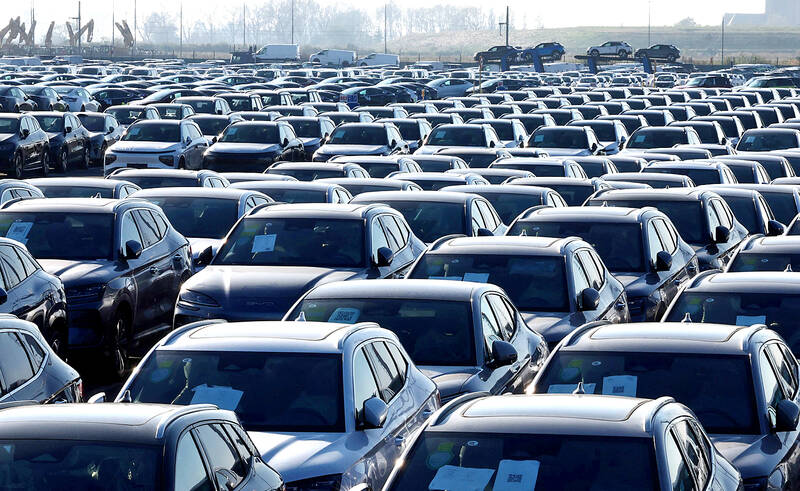The EU has imposed duties on imports of electric vehicles (EVs) from China starting yesterday after talks between Brussels and Beijing failed to find an amicable solution to their trade dispute.
EVs have become a major flashpoint in a broader trade dispute over the influence of Chinese government subsidies on European markets and Beijing’s burgeoning exports of green technology to the bloc.
“By adopting these proportionate and targeted measures after a rigorous investigation, we’re standing up for fair market practices and for the European industrial base,” European Commission Executive Vice President Valdis Dombrovskis said on Tuesday.

Photo: Reuters
“In parallel, we remain open to a possible alternative solution that would be effective in addressing the problems identified and WTO-compatible,” he added.
The duties would stay in force for five years, unless an amicable solution is found.
According to the commission, which manages trade disputes on behalf of the 27 EU member countries, sales of Chinese-built electric cars jumped from 3.9 percent of the EV market in 2020 to 25 percent by September last year, in part by unfairly undercutting EU industry prices.
The duties on Chinese manufacturers would be 17 percent on cars made by BYD Co (比亞迪), 18.8 percent on those from Geely Holding Group Co (吉利控股集團) and 35.3 percent for vehicles exported by China’s state-owned SAIC Motor Corp (上海汽車). Geely has brands including Polestar and Sweden’s Volvo, while SAIC owns Britain’s MG, one of Europe’s best-selling EV brands.
Other EV manufacturers in China, including Western companies such as Volkswagen AG and BMW AG, would be subject to duties of 20.7 percent. The commission has an “individually calculated” rate for Tesla Inc of 7.8 percent.
The Chinese Ministry of Commerce objected to the measures as protectionist and unfair.
“China does not agree with it and will not accept the ruling,” the ministry’s statement said. “China will continue to take all necessary measures to resolutely safeguard the legitimate rights and interests of Chinese companies.”
The EU’s retaliatory duties have run into opposition in Germany, which has Europe’s biggest economy and is home to major automakers.
Hildegard Muller, president of Germany’s auto industry association VDA said the imposition of the tariffs is “a setback for free global trade and so for prosperity, the preservation of jobs and Europe’s growth.”
The move increases the risk of a far-reaching trade conflict, Muller said in a statement.
“The industry is not naive in dealing with China, but the challenges must be resolved in dialogue,” Muller added.
The rapid growth in China’s market share has sparked concern in the EU that Chinese cars would eventually threaten the EU’s ability to produce its own green technology to combat climate change. Business groups and unions also fear that the jobs of 2.5 million auto industry workers could be put in jeopardy, as well as those of 10.3 million more people whose employment depends indirectly on EV production.

SEEKING CLARITY: Washington should not adopt measures that create uncertainties for ‘existing semiconductor investments,’ TSMC said referring to its US$165 billion in the US Taiwan Semiconductor Manufacturing Co (TSMC, 台積電) told the US that any future tariffs on Taiwanese semiconductors could reduce demand for chips and derail its pledge to increase its investment in Arizona. “New import restrictions could jeopardize current US leadership in the competitive technology industry and create uncertainties for many committed semiconductor capital projects in the US, including TSMC Arizona’s significant investment plan in Phoenix,” the chipmaker wrote in a letter to the US Department of Commerce. TSMC issued the warning in response to a solicitation for comments by the department on a possible tariff on semiconductor imports by US President Donald Trump’s

The government has launched a three-pronged strategy to attract local and international talent, aiming to position Taiwan as a new global hub following Nvidia Corp’s announcement that it has chosen Taipei as the site of its Taiwan headquarters. Nvidia cofounder and CEO Jensen Huang (黃仁勳) on Monday last week announced during his keynote speech at the Computex trade show in Taipei that the Nvidia Constellation, the company’s planned Taiwan headquarters, would be located in the Beitou-Shilin Technology Park (北投士林科技園區) in Taipei. Huang’s decision to establish a base in Taiwan is “primarily due to Taiwan’s talent pool and its strength in the semiconductor

An earnings report from semiconductor giant and artificial intelligence (AI) bellwether Nvidia Corp takes center stage for Wall Street this week, as stocks hit a speed bump of worries over US federal deficits driving up Treasury yields. US equities pulled back last week after a torrid rally, as investors turned their attention to tax and spending legislation poised to swell the US government’s US$36 trillion in debt. Long-dated US Treasury yields rose amid the fiscal worries, with the 30-year yield topping 5 percent and hitting its highest level since late 2023. Stocks were dealt another blow on Friday when US President Donald

UNCERTAINTY: Investors remain worried that trade negotiations with Washington could go poorly, given Trump’s inconsistency on tariffs in his second term, experts said The consumer confidence index this month fell for a ninth consecutive month to its lowest level in 13 months, as global trade uncertainties and tariff risks cloud Taiwan’s economic outlook, a survey released yesterday by National Central University found. The biggest decline came from the timing for stock investments, which plunged 11.82 points to 26.82, underscoring bleak investor confidence, it said. “Although the TAIEX reclaimed the 21,000-point mark after the US and China agreed to bury the hatchet for 90 days, investors remain worried that the situation would turn sour later,” said Dachrahn Wu (吳大任), director of the university’s Research Center for